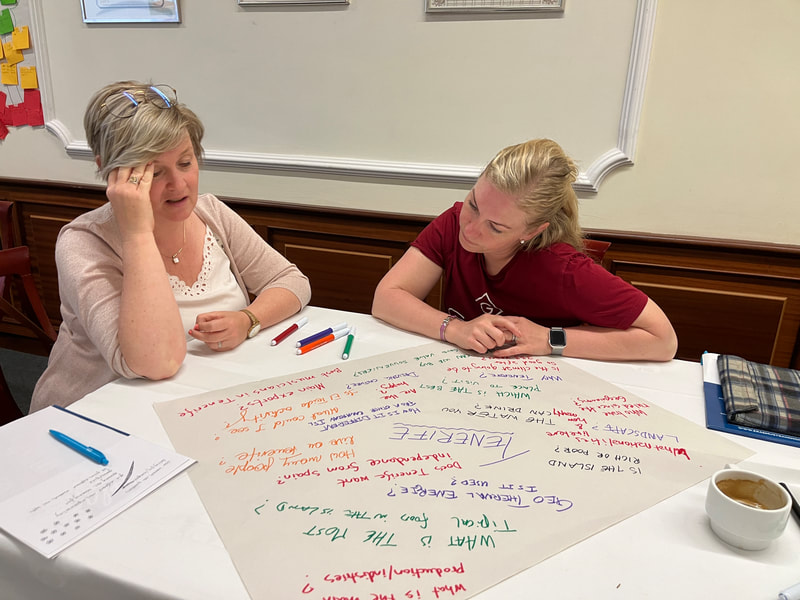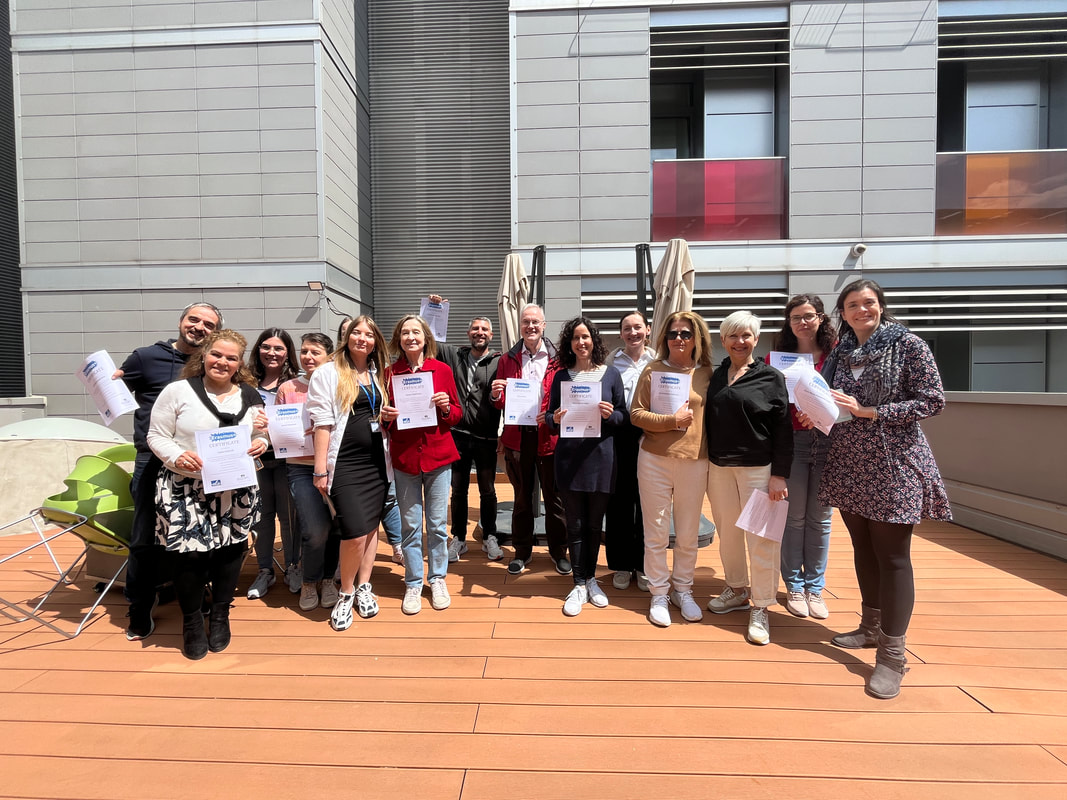|
Engaging students presents a multifaceted challenge. However, employing innovative methods proves to be a valuable asset in both motivating students and enriching their learning experiences. Thanks to extensive research, a whole asset of tools is now at our disposal within the educational landscape. From project-based learning to non-formal education, Peer-Learning, gamification and leveraging ICT, numerous opportunities exist to complement traditional teaching approaches. The new edition of the course “Innovative teaching methods for teachers, school and adult education staff” took place in Bologna from 21/04/2024 to 27/04/2024. The participants came from all across Europe, with Renate, Michael, Erini and Hülya from Bayerischer Volkshochschulverband e.V. in Germany, Pinelopi, Eleni, Georgios and Giannis from Vocational High School of Amorgos in Greece, Eva, Silije and Anita from Haugaland VGS in Norway, and participants coming from two different Spanish schools: Clara and Silvia from CEIP Jaume I, and Rosa María from Instituto de Enseñanza Secundaria Leonardo da Vinci. The course started with the introduction to the definition of “innovation”, diverse innovative teaching methods and the particular challenges that modern teachers are facing - generation gap, appearance of Generation Alpha and different learning styles among students. The participants discovered key competences in the 21st century and necessary teaching skills to develop them in youth. Then everyone had an opportunity to present their school, share their difficulties and ways they deal with them in their home countries, which led to a fruitful discussion and exchange of useful practices. To start exploring the variety of tools to apply with students, visual strategies, quests and teambuilding games showed the power of Non-Formal Education. In fact, starting from the activities, we explored Kolb's experiential learning cycle, highlighting the necessity of the debriefing stage and took a look at various options to conduct it. The participants learned how it allows it to pass from reflection to conceptualization and application, giving the student an active role in the learning process. Also in the classroom we established the difference between formal, non-formal and informal education and ways to apply non-formal education in a formal context and environment. The next day was dedicated to gamification and game-based learning, learning diverse elements of games possible to implement in an educational context. After that, the participants were “locked” in a digital escape room trying to solve riddles and puzzles to escape. Participants finally tried to find the best way to gamify their own classrooms taking into account their students’ needs and characteristics, creating their own escape rooms using Google Forms. Getting acquainted with modern online tools, they were able to produce a significant improvement of students’ engagement and bring a spark in the classroom!
Following that, based on the challenges identified on the first day, the teachers experienced a few practical activities developing their soft skills and emotional intelligence. This term indicates the ability to recognise not only our own feelings but also other people’s emotions, in order to be aware of ourselves and our surroundings. Another skill that was tackled during this session was empathy, through diverse videos and “Empathy Bingo” activity. Another set of tools seen that day was Peer-Based Learning and Assessment, exploring and testing right away practical activities to apply. Each day the group also explored innovative teaching methods with ICT. We practised several tools in class - Kahoot, Bamboozle, Quizlet, Socrative, MentiMeter etc, finding out new ways to engage students, assess and display a lesson. This aspect helped participants to understand how to work with a more innovative approach in their classes. Finally, Project Based Learning allows students to delve into content in a more direct and meaningful way, starting from a topic question and trying to investigate real world issues. Analysing the principles of PBL, the participants of the course had the opportunity to discover how teamwork, collaboration, and creativity can help students to discover the way to deal with real problems, learning strategically and searching for the answers from the start. By Friday, team spirit was so high that it was difficult to say goodbye. However, our group was very motivated to go back and start applying all the many ideas and competences that emerged during the course. Another great week of inspiration was over, but only to be continued back in their countries. Discover more about this course here. |
Welcome to the ELA Blog. Here you will find articles and photos of our courses and have a look at the topics addressed during the week in Bologna, Palermo and Tenerife. You will also have the chance to take a peek at our projects and check out what we have been up to.
Archives
July 2024
Categories |
-
Course catalogue
- 2023-2024 course catalogue
- Soft Skills >
- ICT and New Technologies >
- Inclusion and Diversity >
-
Innovative Teaching Methods
>
- Innovative teaching methods discovery
- Non-formal education teaching methods
- Dual education and work-based learning
- Teaching leadership and entrepreneurship
- Project based learning
- Game based learning and gamification
- Green skills
- Outdoor education
- Outdoor education trekking edition
- Promoting creativity and critical thinking
- Languages and EU projects >
- Preschool >
- Erasmus Plus KA1
- What we do
- About us
- Locations
- Blog
- Contact us
 English
English български
български Čeština
Čeština Español
Español Français
Français ελληνικά
ελληνικά Italiano
Italiano Polski
Polski Português
Português Română
Română






 RSS Feed
RSS Feed









